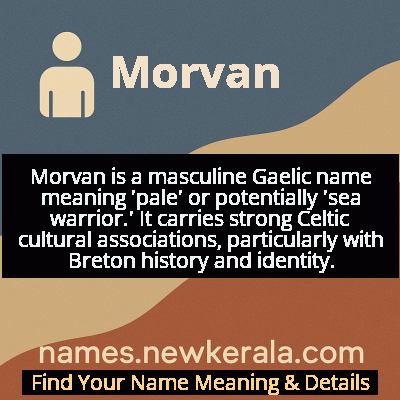Morvan Name Meaning & Details
Origin, Popularity, Numerology Analysis & Name Meaning of Morvan
Discover the origin, meaning, and cultural significance of the name MORVAN. Delve into its historical roots and explore the lasting impact it has had on communities and traditions.
Name
Morvan
Gender
Male
Origin
Gaelic
Lucky Number
2
Meaning of the Name - Morvan
Morvan is a masculine Gaelic name meaning 'pale' or potentially 'sea warrior.' It carries strong Celtic cultural associations, particularly with Breton history and identity.
Morvan - Complete Numerology Analysis
Your Numerology Number
Based on Pythagorean Numerology System
Ruling Planet
Moon
Positive Nature
Diplomatic, friendly, artistic, empathetic.
Negative Traits
Over-sensitive, moody, indecisive, prone to self-pity.
Lucky Colours
Green, cream, white.
Lucky Days
Monday.
Lucky Stones
Pearl, moonstone.
Harmony Numbers
1, 3, 4.
Best Suited Professions
Diplomats, mediators, caregivers, artists.
What People Like About You
Cooperative spirit, friendliness, artistic talent.
Famous People Named Morvan
Morvan Lez-Breizh
Breton chieftain and folk hero
Legendary Breton ruler who resisted Frankish expansion and became a national symbol of Breton independence
Morvan Marchal
Architect and political activist
Designer of the modern Breton flag (Gwenn-ha-du) and prominent Breton nationalist
Morvan Salez
Musician and composer
Breton folk musician known for preserving and modernizing traditional Celtic music
Name Variations & International Equivalents
Click on blue names to explore their detailed meanings. Gray names with will be available soon.
Cultural & Historical Significance
The cultural significance of Morvan extends beyond historical figures to represent the broader Celtic resistance to cultural assimilation. In modern times, the name has been adopted by Breton nationalists and cultural activists as a symbol of Breton identity and autonomy. The name appears frequently in Breton literature, music, and artistic expressions that seek to preserve and promote Celtic culture. Its usage represents a conscious choice to maintain cultural continuity and honor the struggles of previous generations to preserve Celtic languages and traditions against dominant cultural forces.
Extended Personality Analysis
Individuals named Morvan are often perceived as possessing a quiet strength and deep resilience, reflecting the name's Celtic warrior heritage. They tend to be introspective and thoughtful, with a pale or reserved exterior that often masks intense inner determination and loyalty. Morvans typically demonstrate strong principles and steadfastness in their convictions, much like the historical figure who defended Breton independence. They often exhibit a connection to tradition and heritage while maintaining a modern adaptability. Their personality combines Celtic romanticism with practical realism, making them both dreamers and doers who approach challenges with quiet confidence rather than brash aggression.
This balance of sensitivity and strength makes Morvans particularly effective in leadership roles where patience and perseverance are valued. They are often drawn to creative or intellectual pursuits that allow them to explore deep themes and connections. Morvans tend to be protective of those they care about and committed to causes they believe in, displaying a fierce loyalty that echoes their namesake's defense of Breton culture. While they may appear reserved initially, they possess deep emotional depth and strong intuitive abilities. Their combination of traditional values and modern thinking often makes them bridges between generations or cultures, able to honor the past while navigating the present.
Modern Usage & Popularity
In contemporary times, Morvan remains primarily a Breton name, though it has seen some diffusion into other Celtic regions and among people of Celtic diaspora. The name maintains moderate popularity in Brittany and among Breton communities worldwide, often chosen by parents seeking to honor their Celtic heritage. While not common in English-speaking countries, it occasionally appears in artistic and academic circles interested in Celtic culture. The name has experienced a slight resurgence in recent decades as part of the broader Celtic cultural revival movement, particularly in Brittany where traditional names are being reclaimed as symbols of cultural identity. Its usage remains strongest in northwestern France but has spread to other regions through cultural exchange and increased interest in unique, meaningful names with historical depth.
Symbolic & Spiritual Meanings
Morvan symbolizes the enduring spirit of cultural resistance and the preservation of identity against assimilation. The name carries connotations of pale light or dawn, representing new beginnings and the persistence of tradition in changing times. Symbolically, it connects to the Celtic concept of the warrior-poet—someone who combines strength with sensitivity, action with reflection. The potential sea-related meaning also links it to Celtic maritime traditions, symbolizing journey, depth, and the connection between land and water. Morvan represents the bridge between ancient heritage and modern identity, embodying the Celtic values of loyalty, courage, and cultural continuity. It serves as a living reminder of the resilience of minority cultures and the importance of preserving unique cultural identities in an increasingly globalized world.

